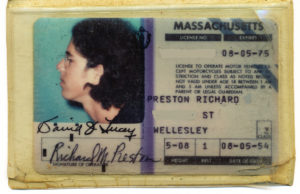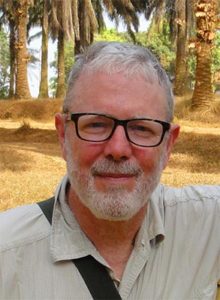Richard Preston’s story
I was born in Cambridge,
Massachusetts, in 1954, and grew up in Wellesley, a suburb of Boston.
As a child, I was shy, and loved books. My dream was to be a starship
colonist heading for Alpha Centauri.
At around age 9, I got into books.
Books were an escape from shyness, and they opened doors leading into
worlds richer and seemingly more filled with wonders than my suburban
New England town.
In the afternoons I would ride my
bike to the town library, where I delved into Mark Twain, Robert
Heinlein, Madeleine L’Engle, Ernest Hemingway, Freddy the Pig, Arthur C.
Clarke, haiku poetry by the Japanese poet Basho … and I explored
science books, especially astronomy.
I’ve been fascinated with the natural universe ever since.
Here’s my first driver’s license, age 16.

My friends and I did a lot of aimless
driving around Boston in my beat-up Ford Falcon, occasionally picking
up a hitchhiker and gloriously driving the person to wherever they
wanted to go.
We went to rock concerts and
protests, and listened to music on vinyl records. (I stayed away from
drugs. LSD scared the daylights out of me.)
In high school, my record included
indifferent grades and an assault on a teacher during a protest. I
didn’t hurt the guy but I pushed him, and that’s an assault, for real.
I was suspended for weeks, almost expelled, and got something like 25
after-school detentions. I richly deserved my punishment.
Despite the trouble, I had some
outstanding teachers in high school. They included Jeanie Goddard,
Gerry Murphy, and the late Dr. Wilbury A. Crockett, [link
http://www.vqronline.org/essay/mr-crockett] the distinguished high
school English teacher who inspired his student Sylvia Plath to write
poetry.
I got rejected from every college I applied to. Afterward I sent an application to Pomona College. Pomona rejected me, saying my application was far too late.
After that I made a collect call to
the dean of admissions at Pomona. (In a collect call, you’d ask the
operator reverse the charges to the person you were calling—you’d make
the person pay for your call. A collect call cost around $20 back
then.)
So I called the Pomona dean of
admissions collect. He accepted the charges. I said to him, “Do you
have a policy where you change your mind?”
No, the dean said politely.
“What are the chances your policy could change?” I asked.
No chance the policy will chang, the dean answered.
After that I started calling the dean
once a week, collect. It cost him twenty dollars each time I called,
but he kept accepting the charges. “Hi dean,” I’d say. “Just checking
to see if your policy has changed.” No, it had not changed.
After paying for about five collect calls, the dean told me that the college’s policy had been adjusted with regard to me—but not changed. In fact, the dean had put me on the college’s waiting list. Then they admitted me.
I caught fire intellectually at Pomona College, majored in English, and graduated summa cum laude.
Later, I ran into the dean of admissions and asked him why he let me
into the college. “I just decided to take a chance on you,” he said.
One lesson is that (polite) persistance can pay off, and the other
lesson is that it never hurts to ask.
After college I went to graduate school at Princeton University, where I got a Ph.D. in English.
While studying for my doctorate at Princeton, I took a writing course taught by the author and New Yorker writer John McPhee.
In McPhee’s course I became fascinated with the idea that nonfiction
writing can be literature—nonfiction can be artistic, sophisticated
writing, writing which is powerful enough to explore any and all aspects
of human existence.
The novel, it seemed to me then, is
like a cathedral. It was created by masters and took centuries to
build. If you were to work on the cathedral of fiction today, you might
be able to add some pieces of beautiful stained glass to a window, but
you would probably not lay the foundations and build the arches and
towers.
Nonfiction narrative, on the other
hand, was something that seemed underexplored as an artistic form. It
was terra incognita for a writer who was interested in developing
different ways of telling a story.
My first book was a narrative nonfiction book about astronomy First Light, published in 1987. It is still in print and is considered a sort of cult classic about science.
Today I live in New Jersey, not far
from New York City, on a place where I climb trees with my children, for
fun. I do my writing in a small office at our place, and enjoy life
with my wife, Michelle Parham Preston, who is working on a book that I
think will fascinate readers when it’s published. We have three
children, all of whom are currently involved in writing and publishing.


